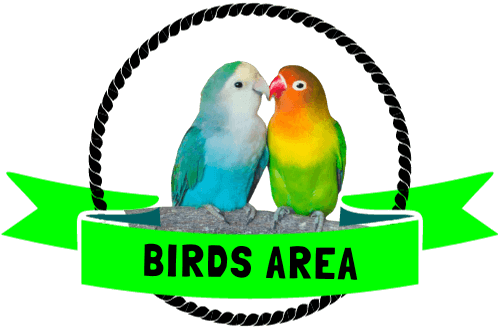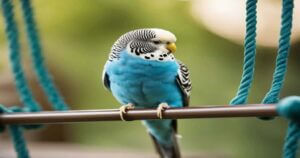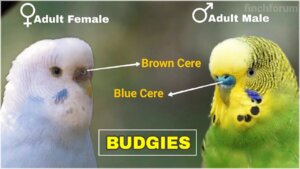How Do Budgies Show Anger?
Unveiling the enigmatic world of our vibrant, chirping companions: budgies. Ever wondered about their emotions and How Do Budgies Show Anger?
Budgies show anger through aggressive behavior and physical signs like fluffing their feathers and squawking loudly. Understanding their body language is crucial for managing their emotions.
So, join the exploration into the nuanced world of budgie behavior as we uncover the captivating signs of their anger and the significance behind their expressions.
How Do Budgies Show Anger? Key The Signs of Aggression in a Budgie

Budgies, like any living being, express their emotions, including anger. Budgie owners must understand the signs of anger in these small parrots to ensure their well-being and proper care.
By recognizing the critical indicators of budgie anger, owners can take appropriate measures to calm their pets and maintain a harmonious relationship.
Vocalizations And Chirping
Budgies exhibit specific vocalizations and chirping patterns when they are angry. Loud screeching and sudden bursts of sharp chirps are common signs of anger in these birds.
Additionally, repetitive squawking and mimicking harsh sounds indicate displeasure or frustration. Owners should recognize these vocal cues to gauge their budgie’s emotional state.
Aggressive Body Language
Observing Budgie’s body language is crucial in identifying anger. When upset, budgies may display puffing up their feathers, fluffing their head feathers, and rapidly blinking their eyes.
Furthermore, aggressive behavior such as biting, wing slapping, and agitated movements can signify anger.
Recognizing these bodily cues allows owners to address their budgie’s emotional needs and prevent potential conflicts.
However, here are some additional signs that your budgie may be angry:
- Nipping: This is Budgie’s most apparent sign of anger. If your budgie bites or nips you, remaining calm and avoiding reacting aggressively is essential. This will only make the situation worse. Instead, identify what may have caused your budgie to become angry and address the issue.
- Screaming or screeching: Budgies may also express anger by screaming or screeching. This is often a sign that they are feeling threatened or stressed. If your budgie is screaming or screeching, try to identify the source of the stress and remove it.
- Tail flicking: Budgies may also flick their tails when they are angry. This is a sign that they are feeling agitated and may be about to bite or nip.
If you think your budgie is angry, remaining calm and avoiding reacting aggressively is essential. This will only make the situation worse. Instead, identify what may have caused your budgie to become angry and address the issue.
Why Does My Budgie Get Angry?

Like any other living being, Budgies can display various emotions, and what might be perceived as anger could be a response to different factors.
Here are some common reasons why a budgie might appear angry or agitated:
- Fear or Threats: Budgies can become angry or agitated if they feel threatened or scared. This might be due to sudden movements, loud noises, or perceived threats, including other pets or unfamiliar people.
- Territorial Behavior: Budgies can be territorial creatures. If they feel their cage or a specific area is being invaded, they may exhibit defensive or aggressive behaviors, which can be mistaken for anger.
- Illness or Discomfort: If a budgie is not feeling well or is in pain, it might become irritable. Changes in behavior, including aggression, can be a sign of health issues, and monitoring your budgie’s overall well-being is essential.
- Lack of Stimulation: Budgies are intelligent and social birds. They may become frustrated or agitated if they are bored or lack mental and physical stimulation.
- Unfavorable Environment: An unsuitable or stressful environment, such as overcrowded cages, extreme temperatures, or lack of proper perches and toys, can contribute to a budgie’s irritability.
- Lack of Trust or Bonding: If a budgie hasn’t developed a bond with its owner or doesn’t trust people due to a lack of positive interactions, it may be more prone to displaying defensive behaviors.
To address any behavioral issues in your budgie, it’s essential to create a safe and stimulating environment, provide proper nutrition, and spend time bonding with your pet.
If you notice persistent changes in behavior or signs of illness, consulting with a veterinarian experienced in avian care is crucial to ensure the well-being of your budgie.
Triggers For Budgie Anger
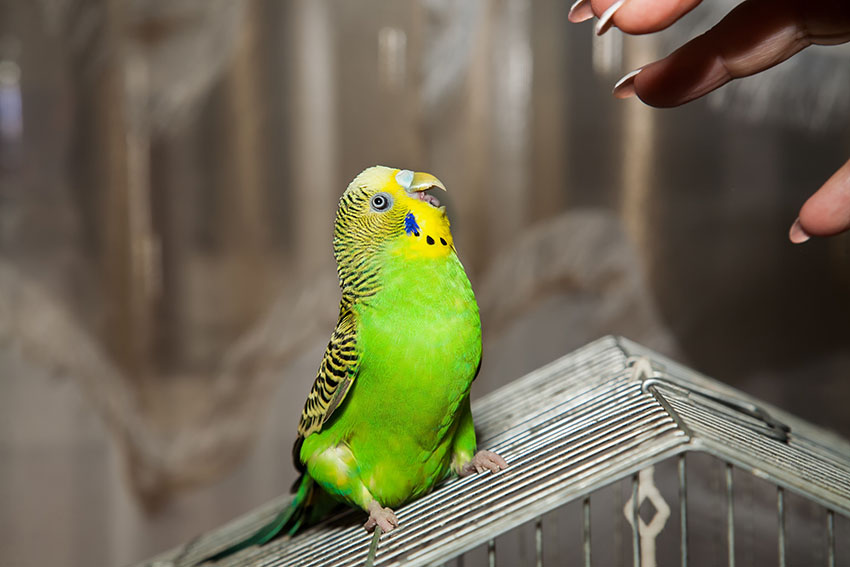
Budgies may exhibit signs of anger or agitation due to various triggers. Understanding these triggers can help you manage your budgie’s environment and behavior more effectively.
Here are common triggers for budgie anger:
Environmental Factors
Budgies are sensitive creatures and their environment plays a significant role in their behavior. Environmental factors, such as loud noises, excessive light, or abrupt changes, can easily trigger anger in budgies.
Providing a calm and peaceful environment for these birds is essential to minimize the risk of anger outbursts.
Human Interactions
Human interactions play a crucial role in triggering Budgie’s anger. Mishandling, sudden movements, or invasion of their personal space can lead to stress and anger in budgies.
However, owners need to understand and respect a budgie’s boundaries and handle them gently to avoid triggering negative emotions.
Others Triggers
| Trigger | Description |
|---|---|
| Sudden Movements | Quick and unexpected actions or gestures near the budgie cause a startling response. |
| Intruders or Predators | The presence of other pets, unfamiliar people, or perceived threats in the environment. |
| Unsuitable Cage or Environment | A cramped or poorly arranged cage, lack of proper perches or toys, and inadequate enrichment. |
| Changes in Routine | Sudden alterations in the budgie’s daily schedule or environment lead to stress and confusion. |
| Hormonal Changes | Fluctuations in hormones, especially during the breeding season, contribute to increased aggression. |
| Feeling Trapped | Restriction of movement or prevention of natural behaviors, causing frustration. |
How To Manage And Mitigate Budgie Anger?
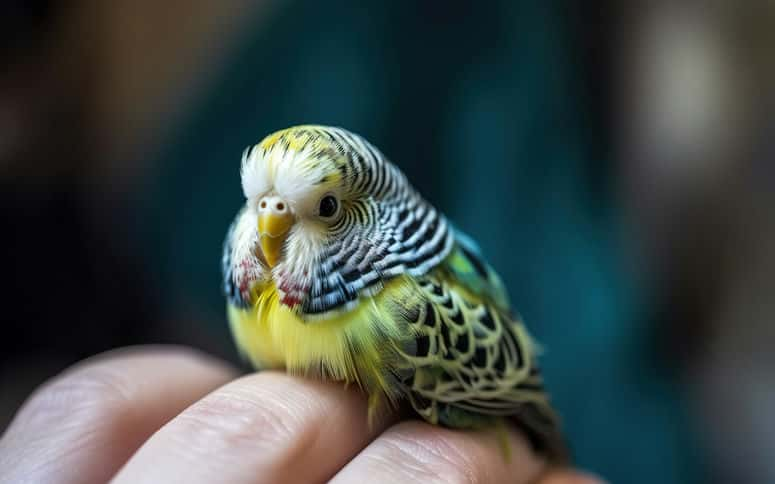
Budgies, like humans, can experience emotions such as anger, and pet owners need to understand how to manage and mitigate this behavior.
Recognizing the signs of anger and employing positive reinforcement techniques can create a safe and comfortable environment for your feathered friend.
Here are some strategies for managing your budgie’s anger:
Providing a Comfortable Home
Ensure your budgie’s cage is roomy, well-ventilated, and equipped with diverse perches and toys. Keep the environment engaging and stimulating with various playthings like mirrors, swings, and chewable items.
Gentle and Calm Interaction
Move slowly and refrain from making sudden noises around your budgie. Spend time daily speaking soothingly and interacting gently to build trust and create a positive bond.
Encouraging Exercise and Exploration
Allow your budgie time to regularly fly in a safe, enclosed space to promote physical activity and mental stimulation. Inside the cage are different perches and climbing structures.
Consistent Routine and Understanding
Stick to a regular schedule for feeding and playtime to establish predictability. Introduce changes gradually to minimize stress. Respect their space and avoid overcrowding their cage.
Health Monitoring and Positive Reinforcement
Keep an eye out for signs of illness and discomfort. Use treats and praise to reinforce good behavior, employing positive reinforcement during training.
Addressing Hormonal Changes
Be aware of hormonal shifts during breeding seasons, adjusting their environment as needed. Provide privacy without encouraging breeding behavior.
Consultation with Experts
Seek guidance from an avian veterinarian if you notice persistent signs of anger or behavioral changes in your budgie. They can rule out health concerns and offer tailored advice.
Enrichment Activities
Rotate toys and introduce new ones frequently to keep your budgie mentally engaged. Consider incorporating puzzle toys or activities that encourage problem-solving skills.
Following these steps can help manage and mitigate budgie anger, creating a happier and more comfortable environment for your feathered friend.
Frequently Asked Questions On How Do Budgies Show Anger?
Do budgies vocalize when they are angry?
Yes, budgies may vocalize their displeasure. They may squawk, screech, or make aggressive chirping sounds. These vocalizations are often louder and more intense than their usual cheerful chatter.
How can I tell if my budgie is upset rather than angry?
Upset budgies may display similar signs of anger, but they might also show signs of fear or anxiety. A stressed budgie may cower, tremble, or try to hide. It’s essential to observe the overall behaviour and context to understand their emotional state.
Can budgies hold grudges?
Budgies don’t hold grudges in the way humans do. Their emotions are more immediate and reactive. However, negative experiences can impact their trust, so it’s crucial to approach them with care and patience after a stressful event.
How should I respond if my budgie is angry?
Give your budgie some space and time to calm down. Avoid making sudden movements or loud noises. Gradually reintroduce positive interactions, such as offering treats or engaging in gentle activities to rebuild trust.
What Should You Not Do When A Budgie Is Angry?
Avoid making sudden movements, as this can escalate the bird’s aggression. Also, refrain from forcing interaction or imposing your will, as this can further agitate the budgie.
Sum Up
Understanding the signs of anger in budgies is crucial for their well-being. We can address their emotions and create a harmonious environment by recognizing their body language and vocal cues.
Responding with patience and empathy is essential building trust and a strong bond with these beautiful birds.
Lastly, you can watch the video below to learn more about 5 odd bird behaviours.
Hello Dear, I'm Poli Kolymnia, owner of many birds (including budgies).
With a deep passion for these feathered companions, I'm here to share my expertise and extensive knowledge on birds care.
My articles cover essential topics like diet, housing, care, and health, providing practical tips to help you create a happy and thriving environment for your birds.
